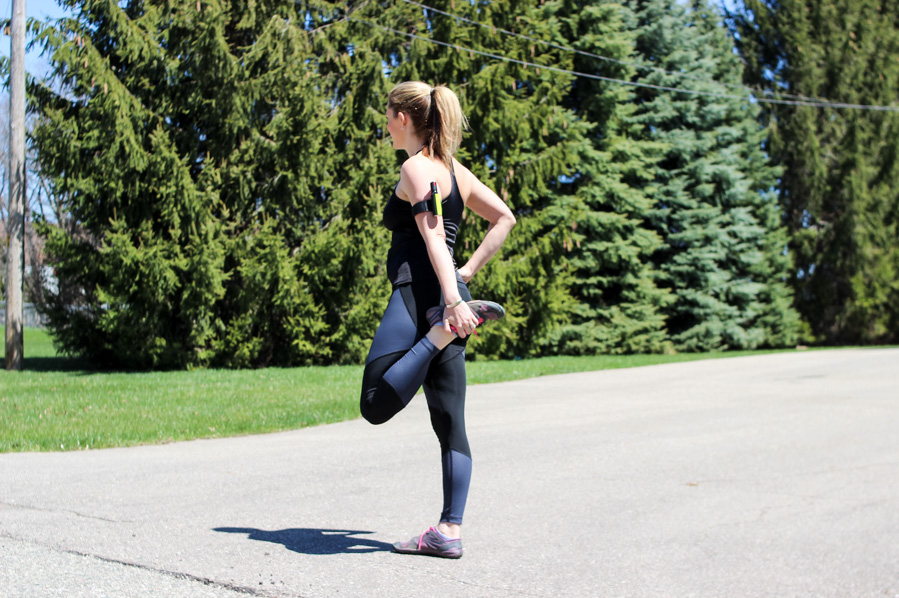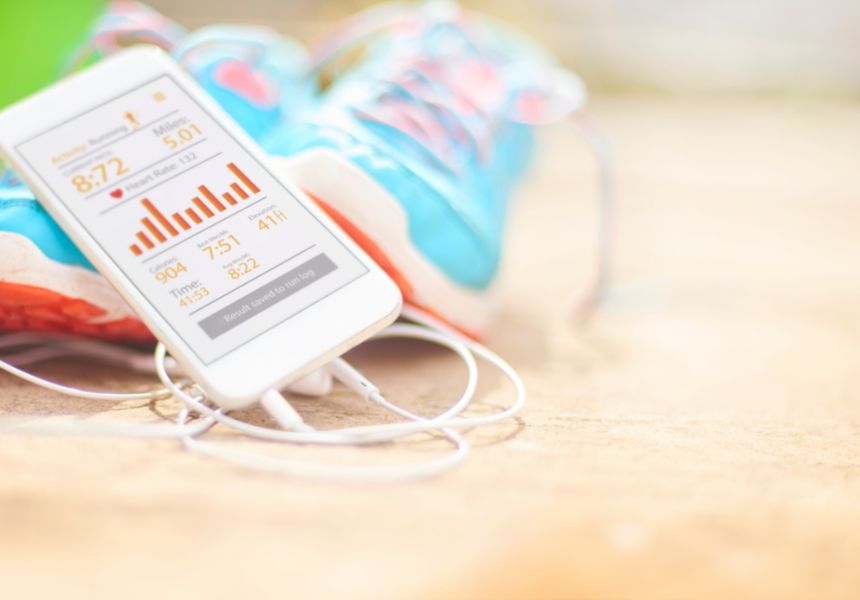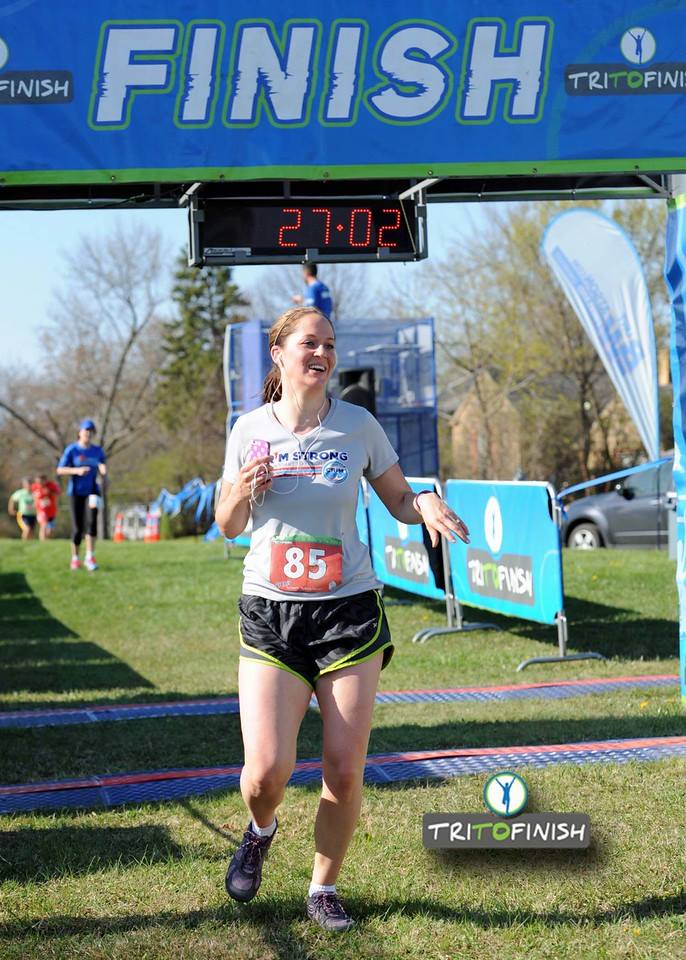Running is one of my favorite workouts for so many reasons. Running is a great way to stay in shape, relieve stress, and lose weight. I also love that it’s an activity that can be done almost anywhere, requires very little equipment and is accessible to many people.

For many, running a 5k is often the first running race that they will try! I remember running my first 5k and feeling so nervous and intimidated, but absolutely had a blast and learned so much along the way. There is a reason that so many get addicted to running and enjoy the competitiveness of racing. Many people experience feel-good post-race endorphins, or what’s often called a “runner’s high”, and the feeling of meeting and surpassing your goals is a huge mood and confidence booster.
It is not always easy for beginners to get started when it comes to running their first 5k because it can often feel overwhelming and many are unsure of where to start.
The following tips will help you feel more prepared and ready for your first 5k!
Tips For Running Your First 5k
5k training
Warmup and Cool Down

It is important to get your body ready for a workout. Many people underestimate the importance of warming up prior to running. You should do some light stretching and then take part in a 5-minute warm up before starting. This warm up allows your body physically and mentally to be prepared to run at a higher intensity. Always make time for stretching – there will be points in your run where you’ll feel tightness or pain which can be avoided with some simple stretches beforehand.
You should also cool down at the end of your workout to help your heart rate decrease to avoid light-headedness and dizziness. A 2 minute walk and some simple stretches are a great way to cool down after running.
Practice Running Short Distances
You might think that you should start running by completing a full 5k but this is not the case, especially if running is completely new to you. You will have to ease your body into it and work up in small steps from there. Start with doing short distances of less than two miles, preferably at an even pace for 30 minutes or more if possible, then gradually increase that distance as time progresses. There are a ton of different running programs and apps available to help you fine tune a running training plan that is best suited for your goals and fitness level.
Build Endurance
The next step after warming up and practicing shorter distances would be building your endurance before hitting the road for a longer duration of running. Doing intervals can help you build stamina because they offer rest periods during which your heart rate decreases substantially while still maintaining some aerobic activity overall. This helps improve cardiovascular fitness levels which will make long runs easier later on down the line!
Anchor Your Run

This is where you decide what pace/distance you want to focus on during that particular session. This will help give your body an idea of how long it needs to prepare itself mentally and physically before running these distances under race conditions.
Accountability Partner

It can be hard to keep up the motivation when you’re running by yourself. Find someone who is also running a 5k and make a plan for your runs together – it will feel like less of an effort! It’s much easier to get out there when someone else is also relying on you for support.
Set Goals
The excitement that comes with reaching goals motivates people more than anything else, so set some smaller ones as well as one big goal.
On 5k Race Day
Start Slow
It’s easy to get caught up in the excitement during your first run and start out at too fast of a pace and burn yourself out too early. A smartwatch that can track your distance and pace is a wonderful tool to keep you on track. Also, many races have pacers for different mile speeds to help your desired pace.
Hydrate, Hydrate, Hydrate!

It’s important that you stay well hydrated before any run so your muscles don’t cramp up or seize up with dehydration. It’s also crucial as when running we use more energy than usual and sweat like crazy – meaning our water levels are depleted faster than normal. Instead of chugging a ton of water right before the race (don’t do this), aim to hydrate often the days leading up to the race. The morning of the race, it can be helpful to drink a few extra cups of water a few hours (2+) before the race. This will give you enough time to get the benefits without having to stop for potty breaks throughout the race.
Get Comfortable in Clothes That Fit Right
Every runner has their own preference for what they wear while running but there are two things every athlete should do: get clothing made specifically for running (it breathes easier, wicks sweat away and allows you to have a more comfortable run. Always do a test run in your clothes prior to a race.
Get Fitted for the Right Shoes

If you’re running with the wrong shoes, your feet will ache and blister. The same can happen if they are too small or tight fitting – there needs to be enough room for them to move without any restriction! Make sure to always wear running shoes a few times before wearing them on race day.
Nutrition
If you’re running a lot, it’s important to take care of your body and make sure that the food you are eating is healthy in order to fuel your body for efficient runs.
On race day, it’s important to eat your last meal 2 to 3 hours before your race – there’s nothing fun about running on a full stomach. Ideally your meal should be lighter with lean protein and whole carbohydrates. Avoid too much fat or fiber as they take longer to digest.
Enjoy It

It might seem like hard work at first but as soon as you see yourself start getting better and faster it becomes more than worth the effort. Running isn’t just about fitness. Running can be amazing for relieving stress, connection with other like-minded people, and an overall way to improve your wellness. Enjoy your first 5k and celebrate the amazing hard work that you did!


Leave A Comment